When we google “self-care,” we often find ourselves surrounded by an aesthetic array of green juices, bubble baths, and manicures.
While these delightful elements can certainly enhance our routines,
don't forget that self-care is also about finding balance and nurturing our well-being from the inside out.
It combines the joy of these practices with a focus on how they make us feel, creating a holistic approach to our health.
In this blog post, I’m going to walk you through some evidence-based, tried-and-tested self-care micro habits that you can do in under five minutes.
These practices have completely transformed my life,
and I hope they help you feel like a better version of yourself too!
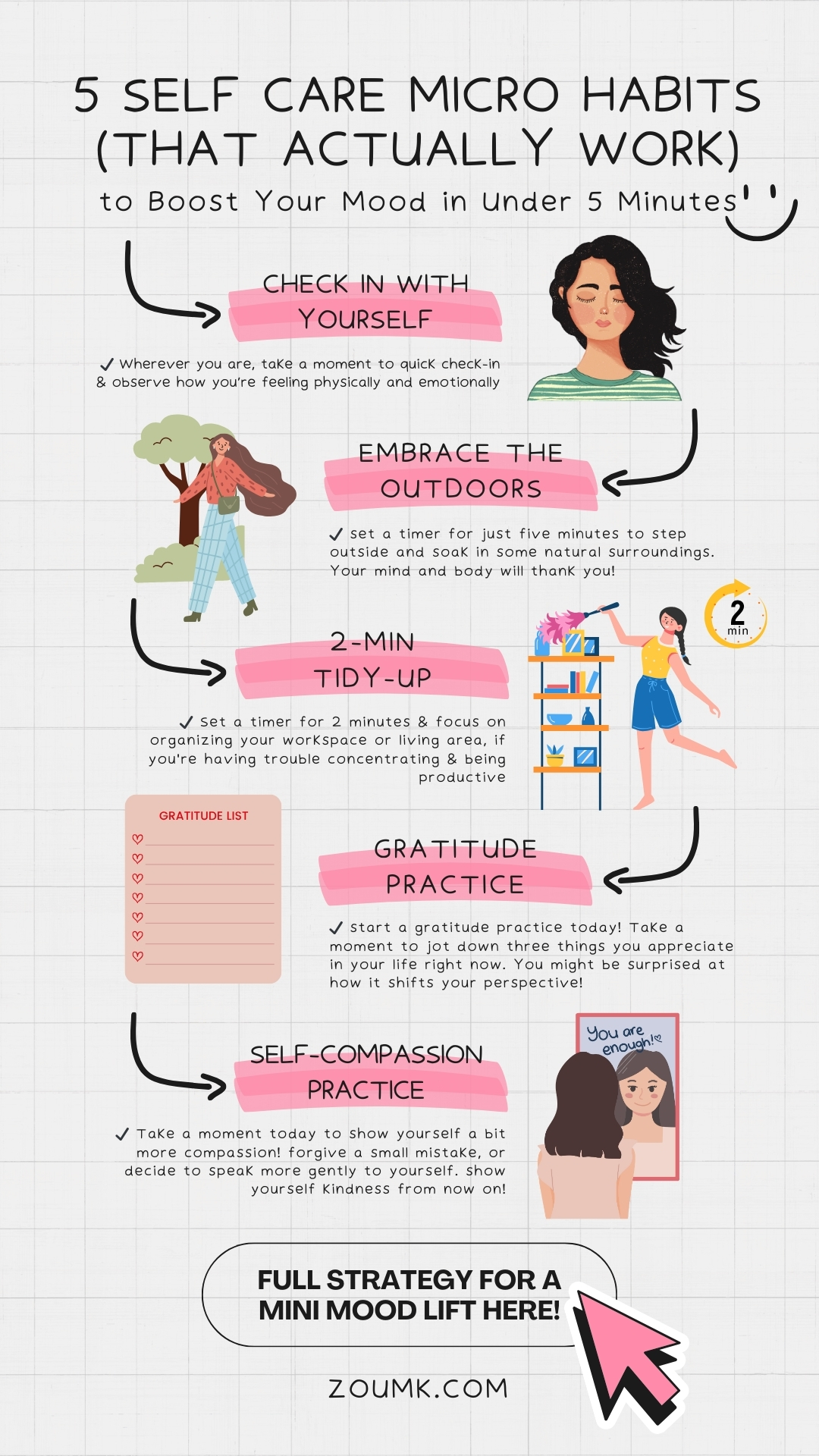
The Cost of Neglecting Self-Care: Why It Matters
In our fast-paced, capitalist society, the terms wellness and self-care have been highly commodified.
We’re bombarded with messages urging us to buy products or pay for experiences to take care of ourselves—think manicures and massages.
However, true self-care is a way of being, not just a way of buying.
It encompasses physical, mental, emotional, and spiritual practices we engage in to keep ourselves healthy and balanced across all aspects of life.
Neglecting this balance can lead to burnout—a state characterized by fatigue, disconnection, and a sense of purposelessness.
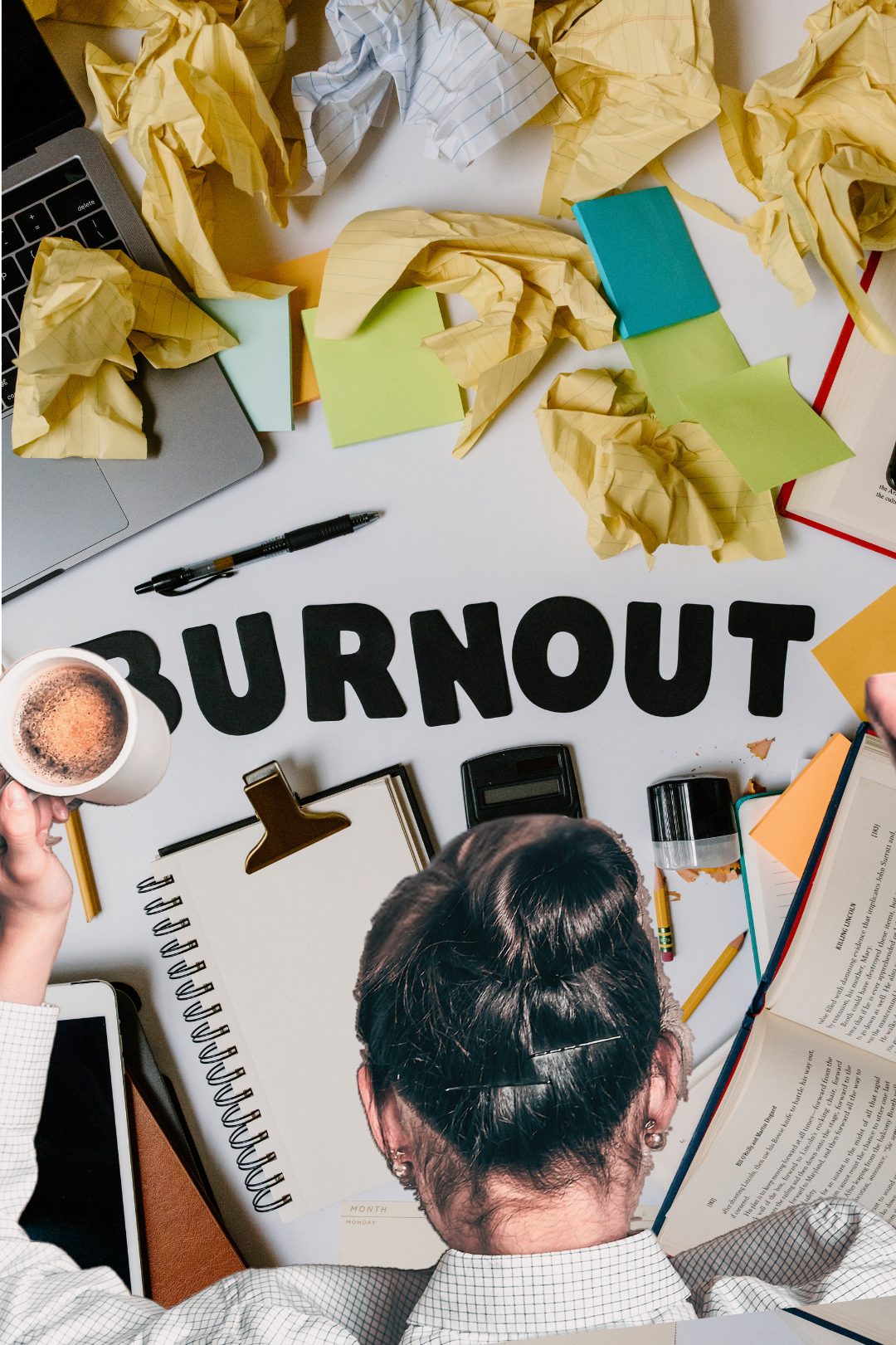
If you’re a bit like me and you want to be productive, get things done that matter, and do it all while maintaining balance, then these micro habits will serve you well.
They are perfect for integrating into your busy day.
So, let's explore the five practical self-care strategies that fit seamlessly into your life, even on the craziest of days!
1. Somatic Pauses: Check In with Yourself
What is a Somatic Pause?
A somatic pause is a quick check-in that allows you to observe how you’re feeling physically and emotionally.
This practice can literally take less than 30 seconds and serves as:
A moment of mindfulness that can reduce stress and enhance well-being.
How to Practice It:
1. Stop and Breathe:
✔️ Wherever you are, take a moment to pause.
✔️ Close your eyes if you feel comfortable and take a deep breath in through your nose.
✔️ Allow your abdomen to expand fully.
✔️ Hold it for a moment.
2. Tune Into Your Body:
✔️ As you exhale slowly through your mouth, pay attention to any areas where you might be holding tension.
✔️ Is it in your shoulders? Your neck? Your stomach?
3. Stretch It Out:
✔️ Gently stretch any tight areas to release that tension.
✔️ Roll your shoulders back, stretch your neck side to side, or even stand up and reach for the ceiling.
4. Reflect on Your Needs:
✔️ Ask yourself what you need at that moment.
✔️ Maybe it’s more rest, a quick snack, or some hydration?
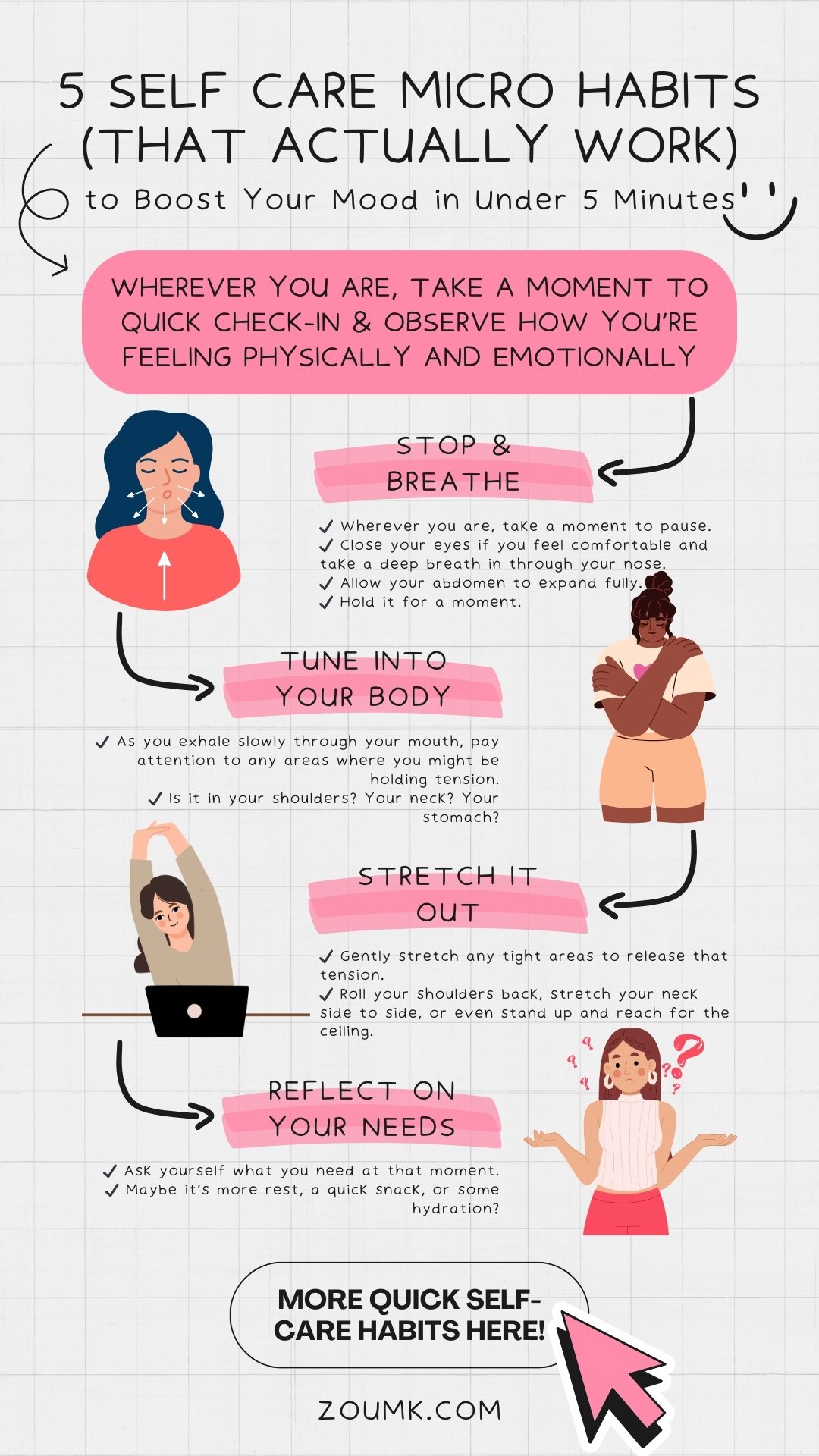
The Benefits of Somatic Pauses
This practice not only helps alleviate tension but also fosters self-awareness.
When you understand your body’s signals—such as tightness or a rapid heart rate—you can address these issues before they escalate into larger emotional challenges.
Engaging in regular somatic pauses enhances your ability to recognize emotions, leading to better emotional regulation.
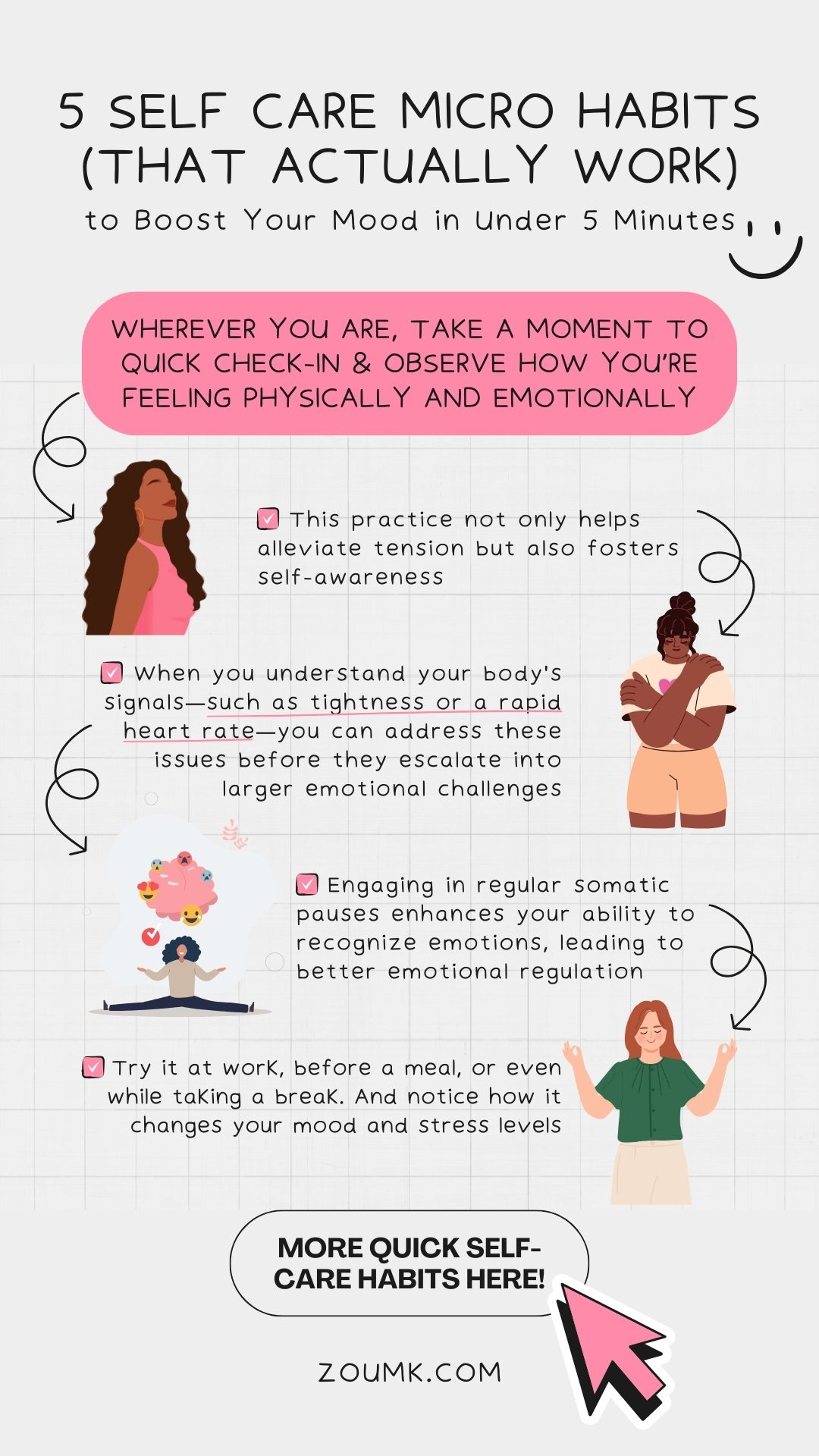
A Little Experience to Share:
I always keep a reminder on my phone to take a somatic pause before critical zoom calls.
Just last week, I had one that filled me with anxiety.
Taking those 30 seconds to breathe and feel my body helped me recognize that my shoulders were tight and my heart was racing.
I stood up, stretched, and by the time the zoom call started,
I felt not only more relaxed but ready to engage with confidence.
Fun Fact: Research shows that taking these moments throughout your day can drastically improve your mental state and overall well-being.
So, why not give it a try?
Integrate a somatic pause into your routine today!
Try it at work, before a meal, or even while taking a break.
And notice how it changes your mood and stress levels. ✔️
2. Micro Nature Breaks: Embrace the Outdoors
The Connection to Nature
Do you ever notice how stepping outside can instantly boost your mood?
This phenomenon can be explained by the biophilia hypothesis, which suggests that humans have an innate desire to connect with nature.
Edward Wilson introduced this concept almost four decades ago, and the benefits are more relevant today than ever.
Quick Nature Tips:
1. Take a 5-Minute Walk:
✔️ Step outside, even if it’s just around the block or in your garden.
✔️ Absorb the sights and sounds of nature around you—notice the colors, smells, and textures.
2. Engage with Your Indoor Plants:
✔️ If you’re stuck indoors, caring for your houseplants can foster a sense of connection to the natural world.
✔️ Take a moment to water them or simply admire their growth.
3. Mindful Observation:
✔️ While you’re outside, practice mindful observation.
✔️ Pick a specific element of nature—a flower, a tree, or a cloud—and focus on its details.
✔️ This can help clear your mind and bring you back to the present moment.
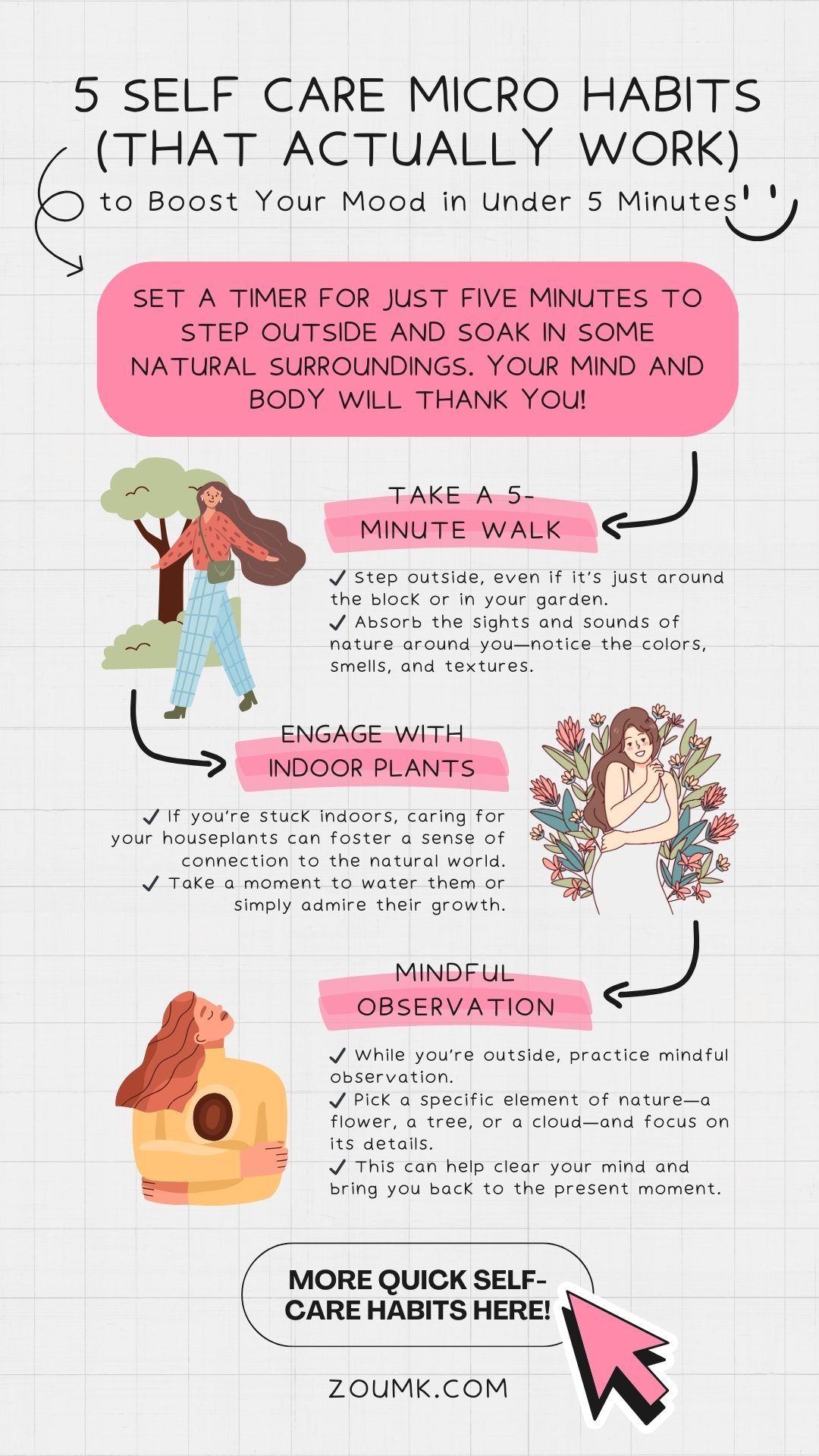
The Science Behind Nature's Benefits
Research shows that time spent in nature reduces cortisol levels and improves focus.
A study from the University of Utah found that individuals who walked in natural settings experienced less mental fatigue and improved attention.
A Little Experience to Share:
A few months ago, I was feeling overwhelmed with work deadlines.
I had been cooped up inside for days, planning and worrying. 😔
One afternoon, I decided to step outside during my lunch break and took a short walk through the park.
The moment I stepped outside,
my mood lifted, my mind cleared, and suddenly, I felt energized and ready to tackle the day!
The sunlight felt warm on my skin, and I noticed the vibrant colors of the flowers.
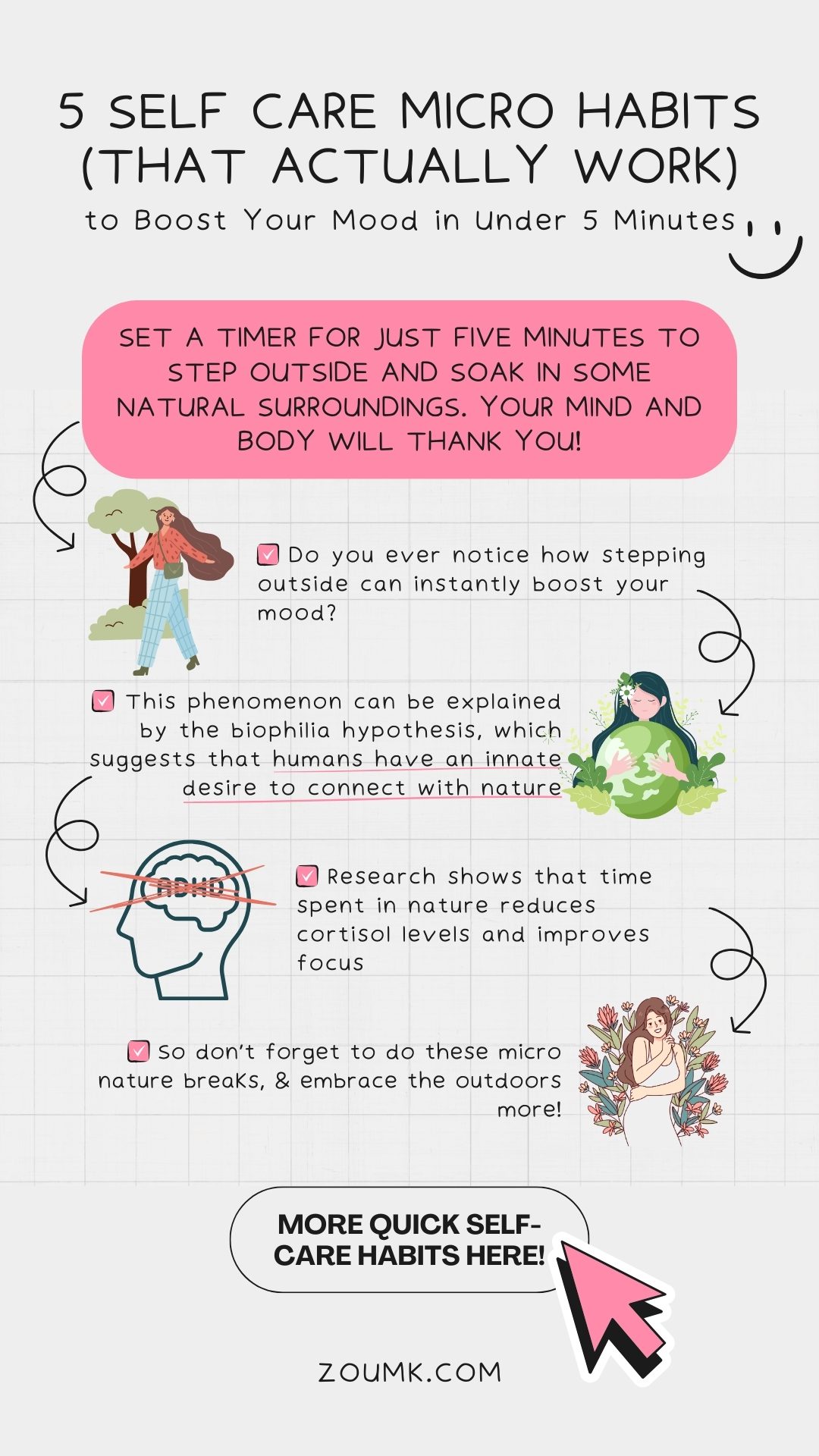
By the end of the walk, I returned to my desk with a refreshed mind and a renewed sense of motivation to take on my tasks—proof that a little nature can work wonders in resetting our minds and spirits!
Take a Moment for Nature
So why don’t you set a timer for just five minutes today to step outside and soak in some natural surroundings?
Your mind and body will thank you!
3. The Two-Minute Tidy: Clear Your Space, Clear Your Mind
The Impact of Clutter
Is your workspace cluttered?
If so, it might be time for a quick tidy-up!
Physical clutter can lead to mental clutter, making it hard to concentrate and feel productive.
How to Tidy Up:
1. Allocate Two Minutes:
✔️ Set a timer for two minutes and focus on organizing your workspace or living area.
✔️ This could be as simple as clearing off your desk or organizing your bookshelves.
2. Focus on Joy:
✔️ Choose to keep only items that spark joy or serve a practical purpose in your space.
✔️ If something doesn’t serve you, consider letting it go.
3. Assess and Refresh:
✔️ After two minutes, take a moment to assess how you feel in your newly tidy surroundings.
✔️ Sometimes, just tidying up a bit can create a huge shift in your mindset.
4. Make It a Habit:
✔️ Try to incorporate this quick tidy-up into your daily routine.
✔️ Consider making it a ritual between tasks or at the end of each work session.
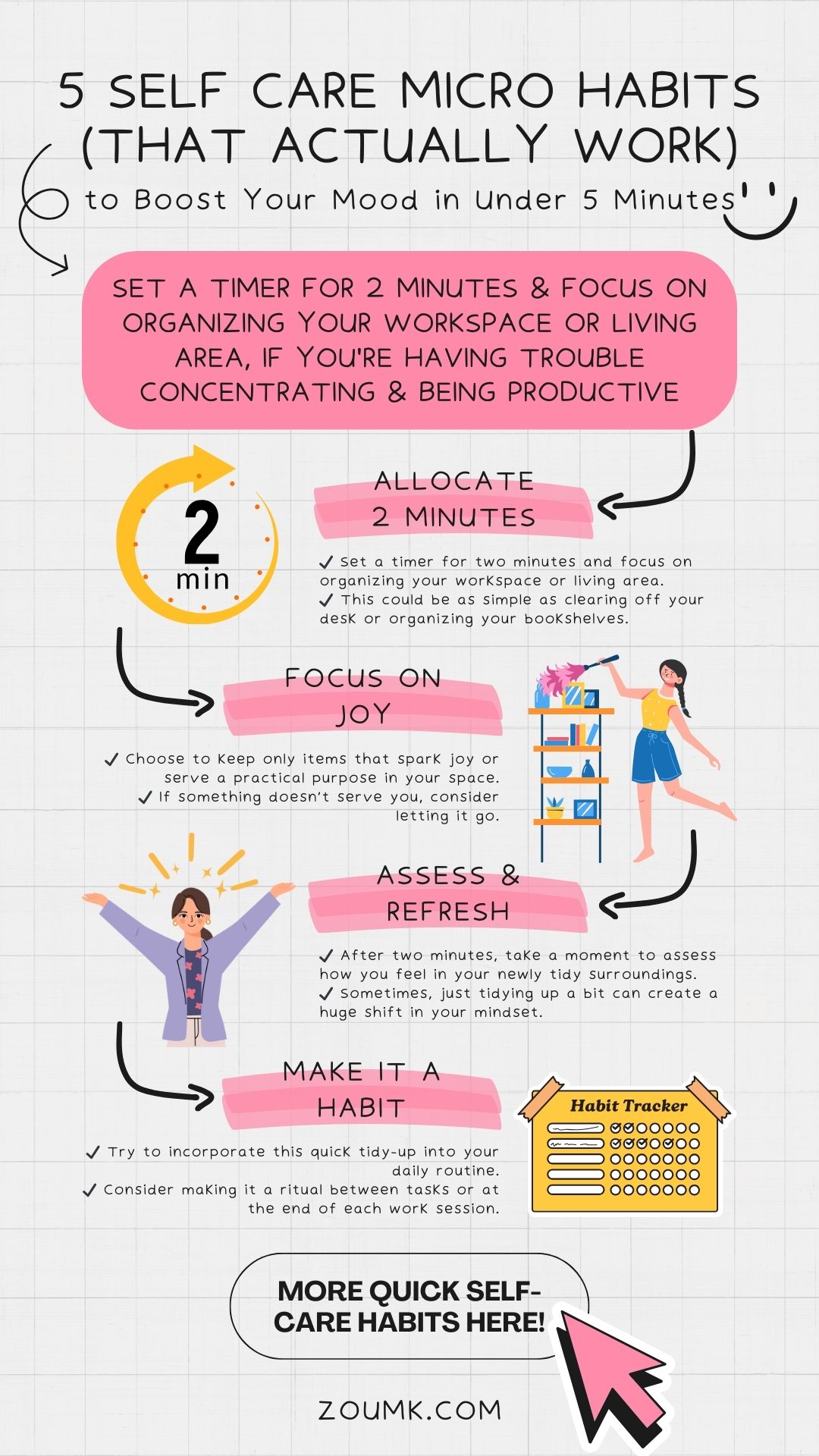
The Psychological Impact of Tidy Spaces
Research shows that a clean environment can improve focus and productivity.
A study conducted by Princeton University found that cluttered spaces can lead to decreased concentration and an increased feeling of chaos.
Engaging in a quick tidy-up can make your environment more pleasant and inviting.
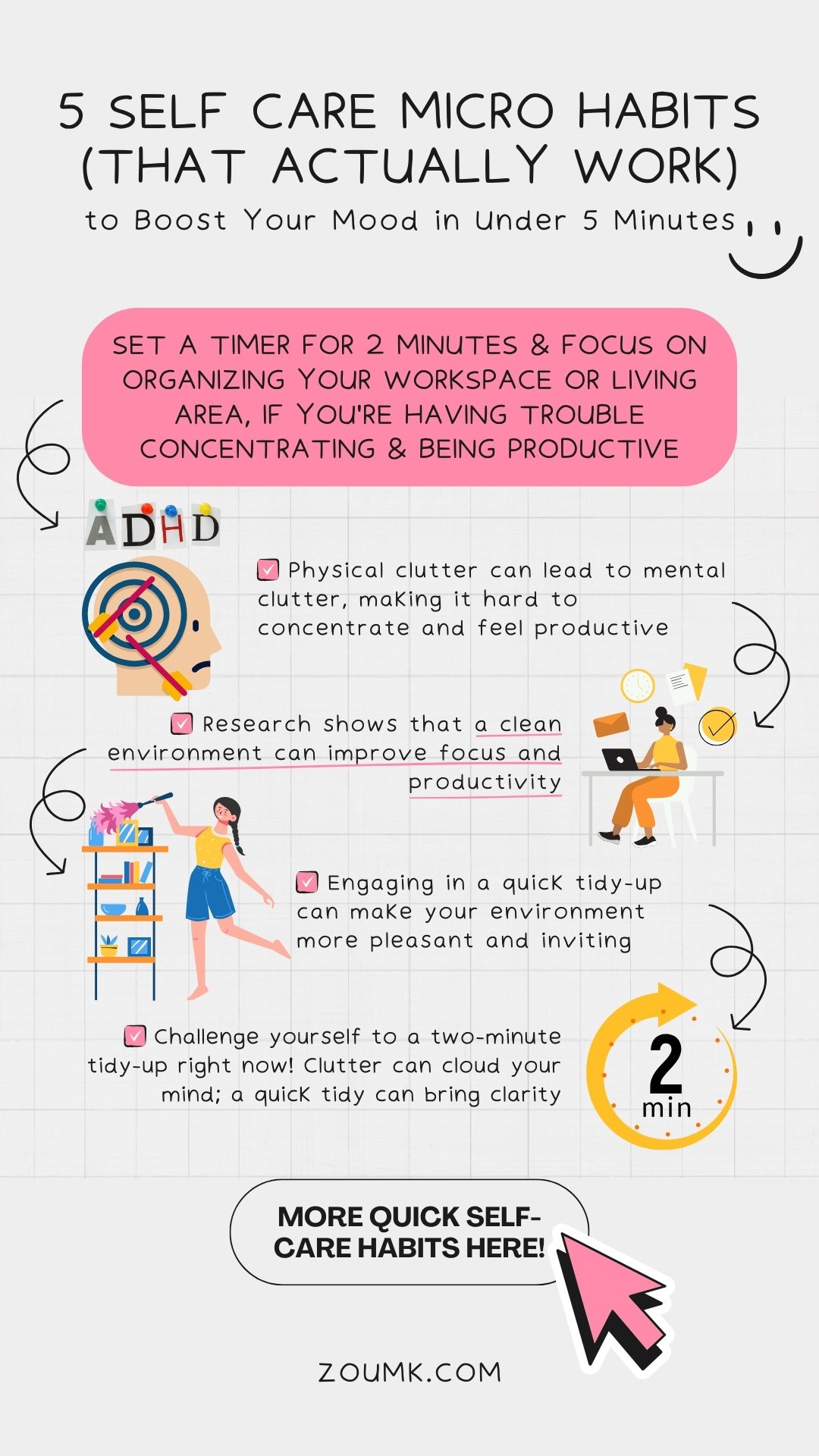
A Little Experience to Share:
I often find that a messy desk leads to a messy mind.
One day, I spent exactly two minutes tidying my workspace, putting away clutter and organizing my notes.
To my surprise, that quick clean-up brought an immediate sense of calm and clarity.
I could think better and even finished a project that had been looming over me.
Take on a Quick Tidy Challenge
Challenge yourself to a two-minute tidy-up right now!
Snap a picture of the results—your before and after—and share it with me in the comments! 🥰
Clutter can cloud your mind; a quick tidy can bring clarity!
4. Gratitude Practice: Cultivating Positivity
The Power of Gratitude
Gratitude isn’t just a polite thing to say—it’s a powerful tool for improving our mood and mental resilience.
Research indicates that a gratitude practice can even enhance physical health!
Simple Gratitude Exercises:
1. Gratitude Journaling:
✔️ Each day, write down 1 to 3 things you’re grateful for.
✔️ This could be as simple as your morning coffee or a friend’s support.
✔️ Take a moment to connect emotionally with each entry.
2. Gratitude Messaging:
✔️ Send a quick text or thank-you note to someone who has positively impacted your life.
✔️ Both you and the recipient will feel uplifted by this simple act!
3. Gratitude Visualization:
✔️ Spend a few moments visualizing the things you are thankful for.
✔️ Picture them vividly in your mind, and allow yourself to feel the associated emotions deeply.
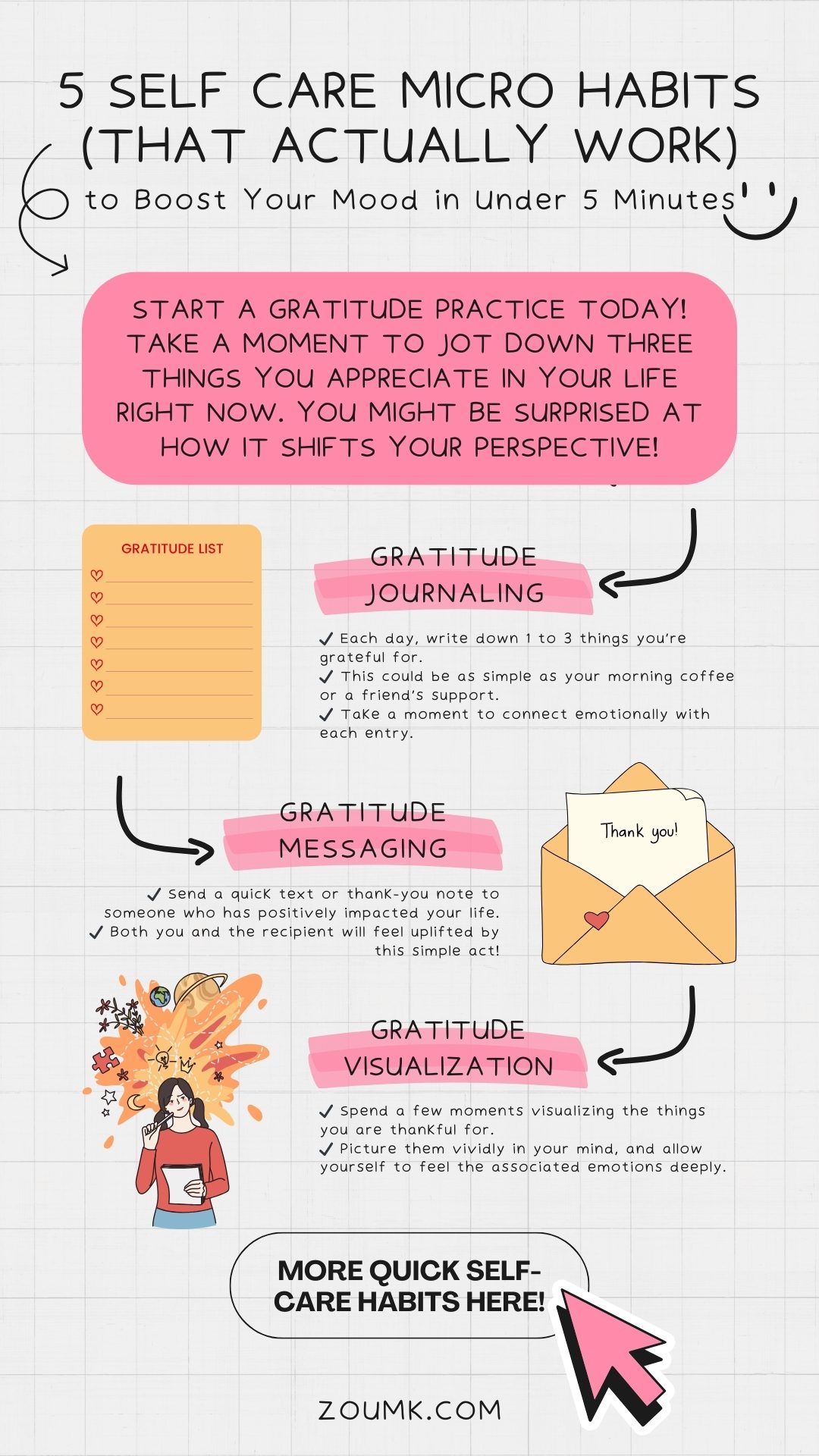
The Benefits of Gratitude
Research has shown that maintaining a gratitude practice can lead to improved mental health overall.
People who consistently express gratitude report feeling more positive emotions, experiencing fewer symptoms of illness, and enjoying stronger social ties.
Inspirational Insight:
One study found that participants who wrote down what they were grateful for once a week reported feeling significantly more satisfied with their lives compared to those who did not.
Gratitude helps shift our focus from what’s lacking to what we have, fostering a sense of abundance.
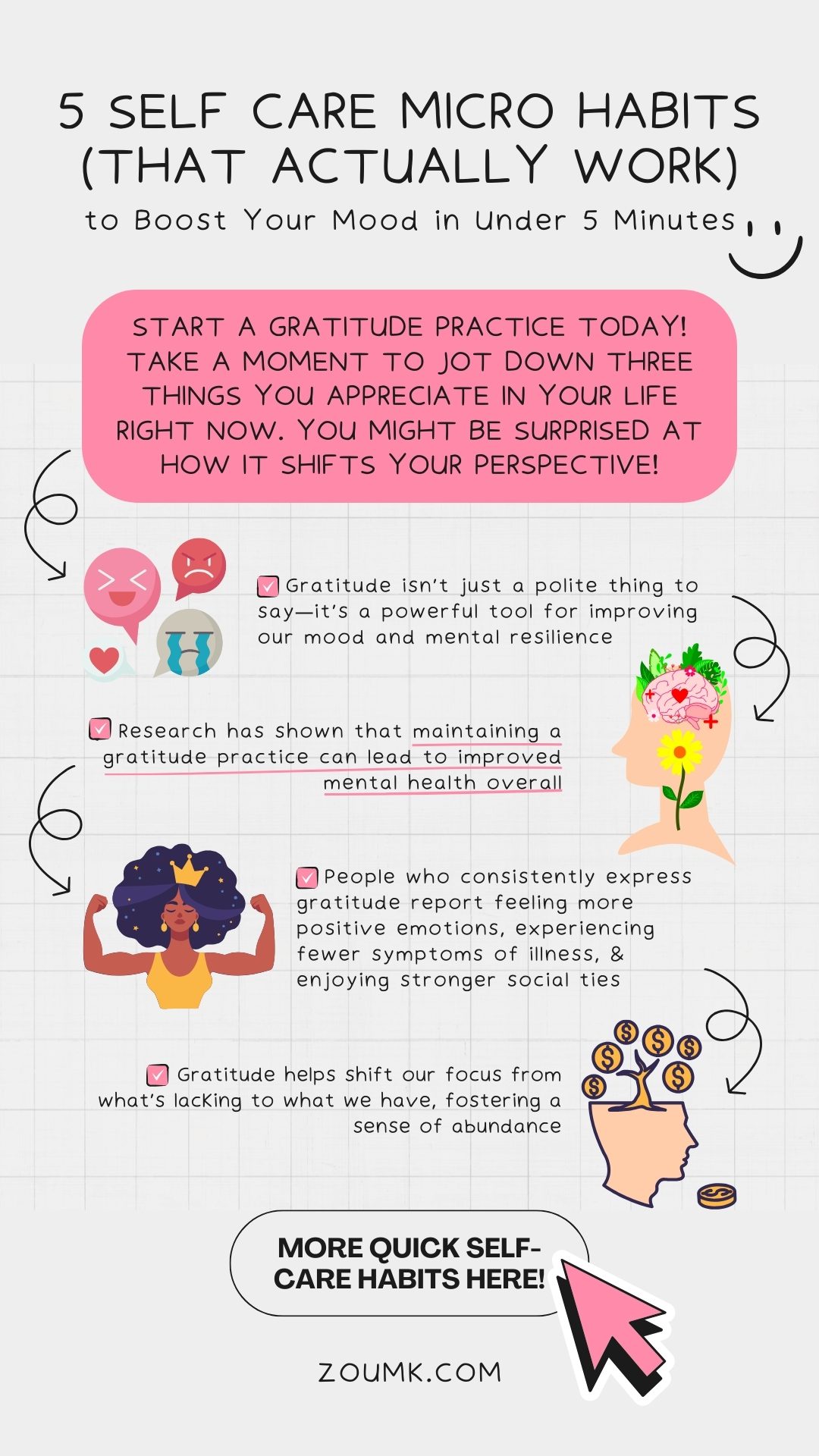
A Little Experience to Share:
I started a gratitude journal during a particularly tough time in my life.
Each evening, I wrote down three things I was thankful for.
Initially, it felt forced, but gradually, I found joy in the small things—a hot cup of tea, a friend’s text, or even a good book.
It shifted my mindset and helped me see the positivity around me.
Give Gratitude a Try
Why not start a gratitude practice today?
Take a moment to jot down three things you appreciate in your life right now.
You might be surprised at how it shifts your perspective!
5. Self-Compassion: Be Your Own Best Friend
The Importance of Self-Kindness
So often, we are our own worst critics!
It’s essential to be kind to ourselves, treating ourselves with the same compassion we would offer a close friend.
Practicing Self-Compassion:
1. Reframe Your Self-Talk:
✔️ When you make a mistake, instead of harsh judgment, remind yourself that everyone makes mistakes.
It’s part of being human!
2. Cultivate Loving-Kindness:
✔️ Use meditations or affirmations that generate feelings of love and kindness towards yourself.
✔️ Start by telling yourself,
“May I be happy, may I be healthy, may I be safe, may I be at ease.”
3. Engage in Self-Compassion Meditation:
✔️ Take a few minutes to focus on self-compassion.
✔️ Sit comfortably, close your eyes, and breathe deeply.
✔️ Visualize sending love and kindness to yourself as you inhale, and release self-judgment as you exhale.
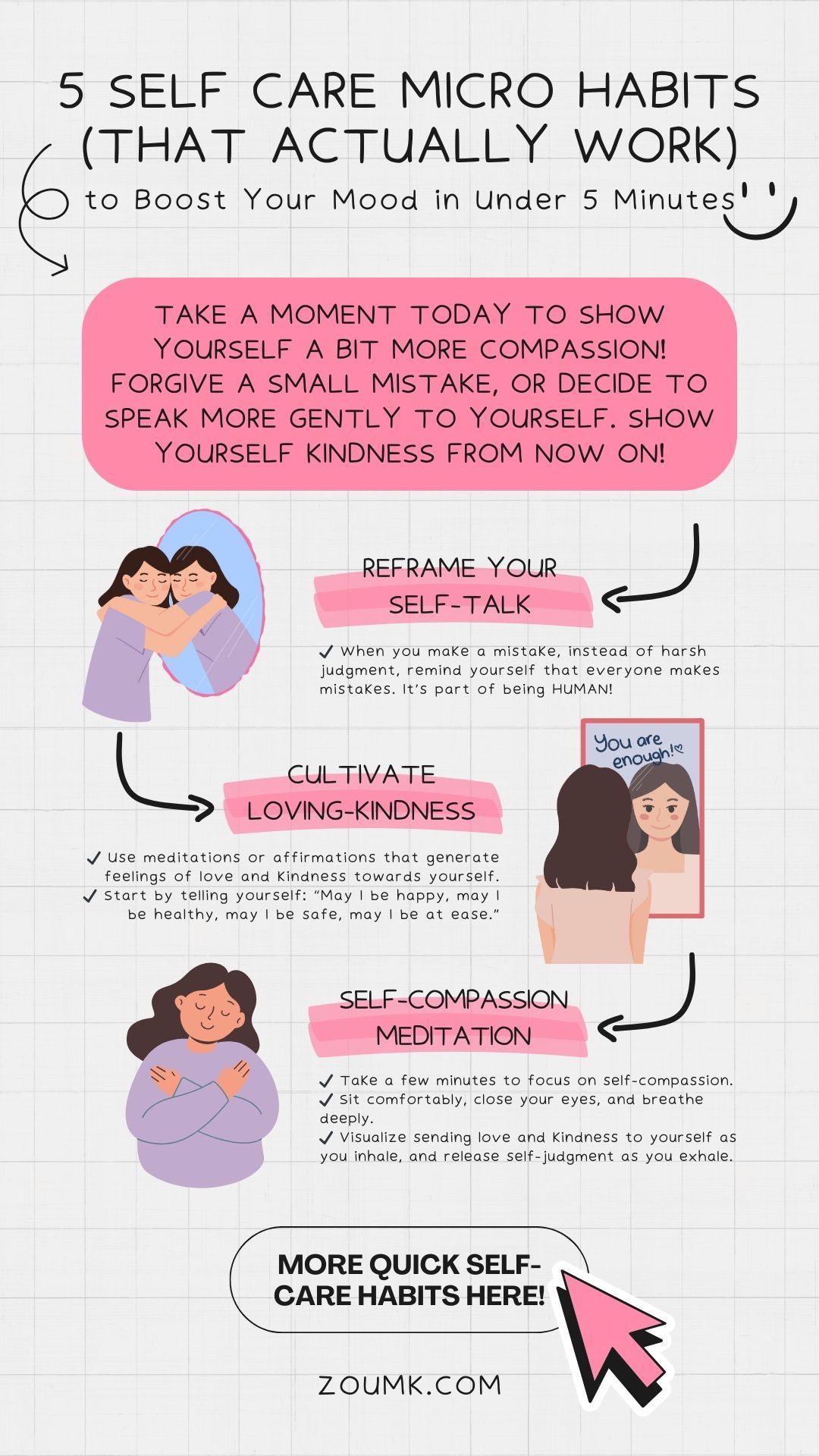
The Importance of Self-Compassion
Research by Dr. Kristin Neff has shown that self-compassion is linked to greater emotional resilience.
When we embrace self-compassion, we realize that imperfection is a shared human experience, and we can be supportive of ourselves through life’s challenges.
A Little Experience to Share:
Once, while reflecting on my day, I realized I had been overly critical of myself for not finishing my to-do list. (It was a really long list tbh)
I decided to treat myself as I would a friend.
I thought, ‘If a friend shared this with me, I would encourage them by saying they had done enough for today. If they finished the list, there would be nothing left to do for tomorrow.’
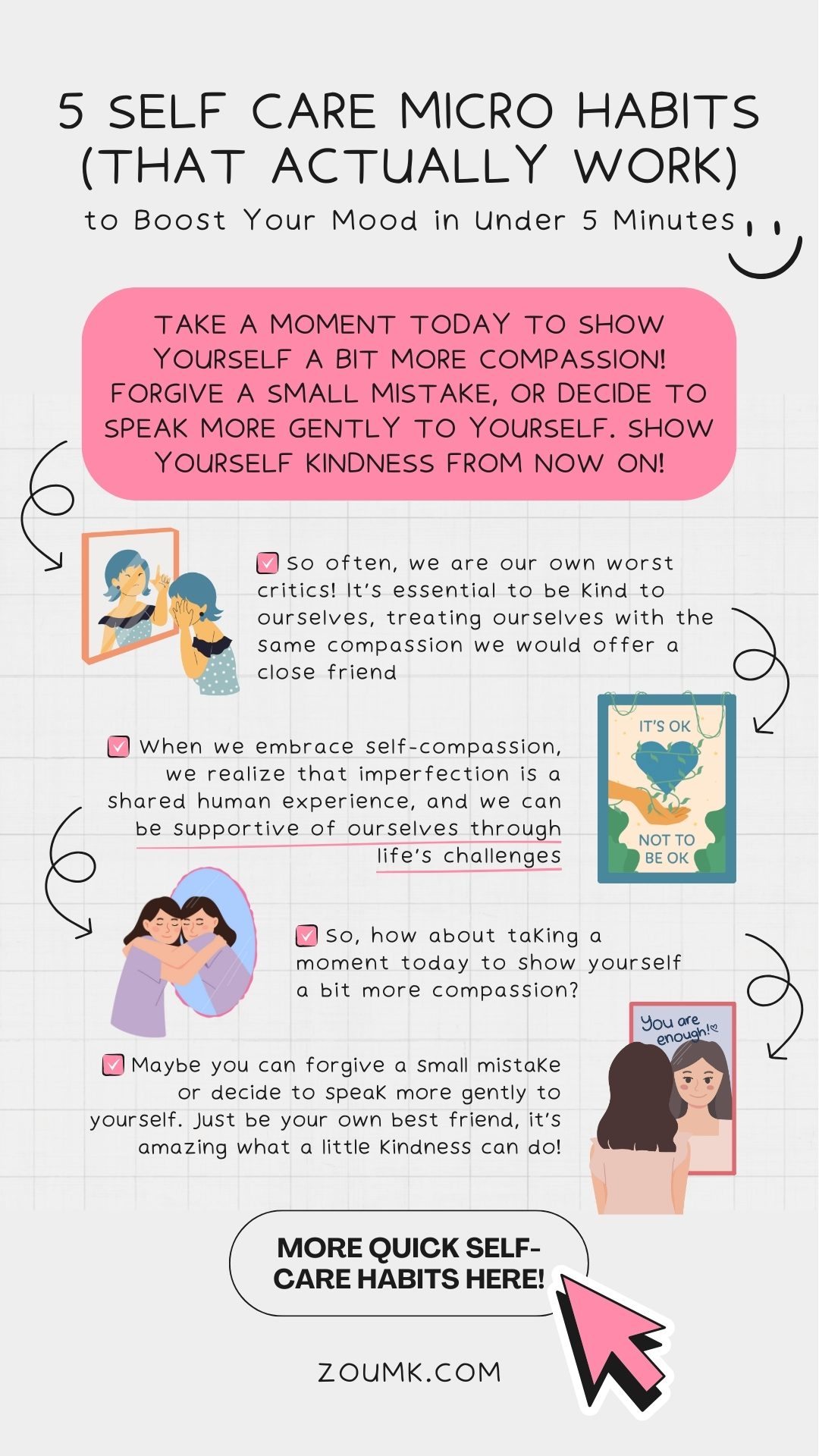
That night, I practiced self-compassion meditation and acknowledged that
it’s okay to not be perfect. I deserved kindness simply for being human!
"Our greatest glory consists not in never falling, but in rising every time we fall." — Confucius
A Thought to Consider
So, how about taking a moment today to show yourself a bit more compassion?
Maybe you can forgive a small mistake or decide to speak more gently to yourself.
Just be your own best friend; show yourself kindness from now on!
It’s amazing what a little kindness can do!
Wrapping It Up: Putting It All Together
Incorporating small, effective self-care habits into your daily routine can lead to significant improvements in your mood and overall well-being.
Each of these micro habits takes less than five minutes, reminding us that
self-care doesn’t have to be extravagant or time-consuming.
Final Challenge
Before you go, take five seconds to choose two habits from this list that you’ll commit to trying this week.
Write them down and share your choices in the comments!
These micro habits are perfect to integrate into your daily routine, helping you boost your mood and enhance your well-being in just a few minutes. Trust me, your future self will thank you for having this resource handy!
Also, feel free to share this post with a friend who could use a little self-care boost.
You never know whose day you might brighten!
Conclusion
This post serves as a heartfelt reminder of the importance of self-care practices that enhance our emotional, mental, and spiritual health.
So don’t forget to save this post for those busy days
when you need a quick reminder to take care of yourself!
These micro habits are perfect for integrating into your daily routine. They can help boost your mood, enhance your well-being in just a few minutes, and help you find balance in your life.





